Guild Wars 2: Tossing out the old
By project343 50 Comments
What Guild Wars 2 tosses out the window...
I was sort of offended by Jeff's comments on the most recent Bombcast. It was almost as if he dismissed Guild Wars 2 as being yet another MMORPG. Granted, he played very little of it, but I'd argue that dismissing the game as being too traditional and mostly irrelevant by today's standards is wholly unfounded.
The MMORPG genre is known for relying on conventions a little too strictly. Developers aren't taking a lot of chances, and when they do, they fail miserably. I thought I'd take the time to outline the conventions that Guild Wars 2 dismisses entirely (or, at least, almost entirely). If you care about Guild Wars 2, you'll probably already know all this stuff; if you don't, well you'd better sit down and pay attention: these are the reasons why people are so goddamn interested in this game.
So without further ado, here is what Guild Wars 2 throws out the window...
Questing
In its traditional form, questing is gone. To give you a little purpose for killing mobs, there are four alternatives to the traditional questing model in Guild Wars 2:
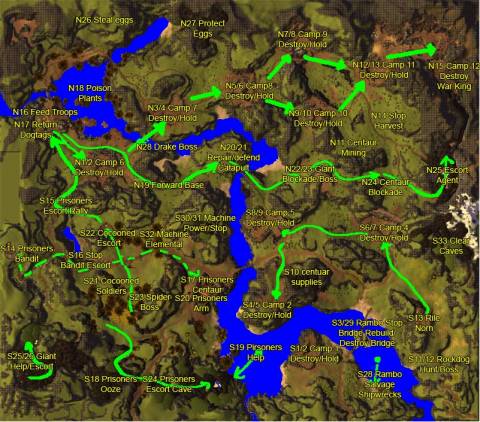
- Dynamic Events - Dynamic events are area-specific quests that spontaneously pop up around the world, often having several objectives that contribute to their completion. You’re awarded gold, karma, and experience based proportionately on your contribution to the event. Dynamic events can chain together, leading to other dynamic events based on the successes and failures of previous events. Example: you’re walking by a harbor, and a dynamic event springs into your interface; as it turns out, you must defend a submarine from being attacked by an underwater enemy faction. If destroyed, a new event may require you to repair the submarine.
- Meta Events - Meta events are a string of related dynamic events that affect the world in a meaningful way. Each zone has several meta events that fundamentally change each section of a zone. Some meta events lead to massive world bosses, others create or destroy NPC hubs. Example: a centaur force ravages the northern area of a zone. At one end of the meta event chain, centaurs have captured all NPC hubs, at the other, they’re pushed back into their stronghold and are ultimately defeated.
- Hearts - Hearts are NPC vendors scattered around the world and displayed on the map (if you talk to a scout). These are social NPC hubs where vendors open up shop for your karma currency if they like you enough. Each hub has many activities to engage in, from drinking games at a tavern to milking cows. They exist to guide you around the world, as traditional questing hub progression ceases to exist in a ‘dynamic’ world. Here's a video of Totalbiscuit starting off by doing some Heart tasks (which he believes to be a dynamic event), but quickly stumbles into a event, followed by a meta-event chain. It does a solid job showcasing the natural flow of content exploration and how the three main open world questing types interact.
- Personal Story - You have a unique, instanced personal story similar to the first Guild Wars. Initially based on your race, your story develops and changes based on the decisions you make throughout your adventure, and when you create your character. Each time you begin a personal story quest, you’ll be brought into your own singleplayer adventure and participate in heavily-scripted, story-driven encounters. If you like, you can invite friends to play through your story cooperatively. Think of this as a more moldable version of The Old Republic's class quests, without the awkwardly limiting instanced doorways. On a related note, you also have a home district in your race's home city; this is an instanced place that evolves and changes based on your progress and decisions. In this video, you'll see a player navigating Divinity's Reach, heading into their home instance, and engaging in a personal story quest from within that instance. Shows off how varied ArenaNet's personal story encounters are, and how effectively they link encounters with narrative in a filler-free system.
Holy trinity
You've probably heard this one a fair bit, and I'm sure you're quite a skeptic. From a design standpoint, ArenaNet effectively removes the ability to specialize into traditional combat roles in a variety of ways:

- There is no traditional aggro mechanic, no taunting
- There are no direct/targeted heals other than self-heals
- The strongest heals in the game are self-heals
- Heavy use of the cooldown forces players to not become reliant on a single skill/set of skills; this encourages players to interchangeably fulfill roles relative to their cooldowns
- Dodging and control skills give everyone the ability to mitigate damage, regardless of resilience
- Distance-as-aggro mechanic allows all players to quickly gain enemy attention, and swap with other players
- Every class has the ability to heal, every class has the ability to mitigate damage
- Skills can be swapped around out of combat, allowing players to swap in and out of various strategies and compositions out of combat
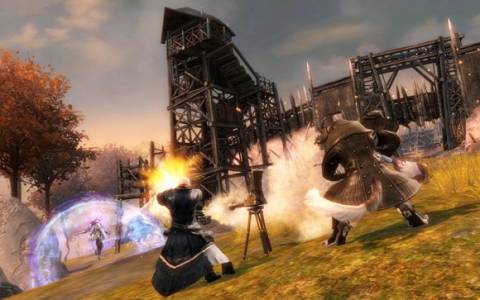
Solo play
You can still play by yourself. But everything from loot to crafting resource nodes is instanced and generated specifically for you. If you’re on an adventure and find a vein of ore with another person, there is no rush: you can both mine it, and the rewards will be instanced for the both of you. There is no mob tagging, experience is given out fully so long as you contribute enough to the kill. Following other players, even out of a group, leads to a cooperative, enjoyable adventure as opposed to a headache. The only real benefit that group gives you is the UI addition to track their health more easily and the private group chat.
Loot rolls
If you and your higher leveled friend kill a level 14 mob, you’ll get gear and money appropriate to your level, and he’ll get gear and money appropriate for his level. When a mob dies, each player loots unique gear for a kill, scaled to your level. No more rolling, no more ninjas, no more walking away from a boss kill without getting something.
Leveling
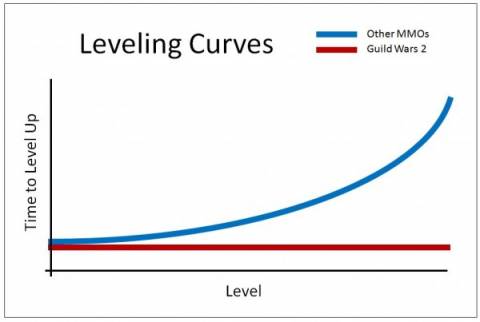
You’re probably thinking: well, there’s nothing stopping a level 80 from one-shotting level 2 mobs and walking away with handfuls of level 80 gear with this before-mentioned system. Actually, there is. You scale downward to the content that you’re doing. If you walk into a level 14 area, you’ll be scaled down in power to match that zone. Sounds like a bummer, but all the loot and gear is scaled up to match your level. What this means is that a level 79 player can quest in any zone across the whole map, even with his level 2 friend and still have a fun, productive time. Levels only exist to gate you from higher level content, but even then, you can freely sidekick up to match a buddy’s level (and all that gear will be level-appropriate scaled downward as well).
It wouldn't be an RPG without leveling. But the downscaling and the lack of an exponential leveling curve means that your level feels a lot less obstructive and limiting to your gameplay experience.
Gear-grind
There is no traditional gear grind. Simple as that. Instead, ArenaNet’s end-game is a little more varied: collectibles everywhere, exploration, achievements, titles, PvP, community stuff, and many other things. Gear is entirely absent from PVP matches, and only plays a minor role in World vs. World.
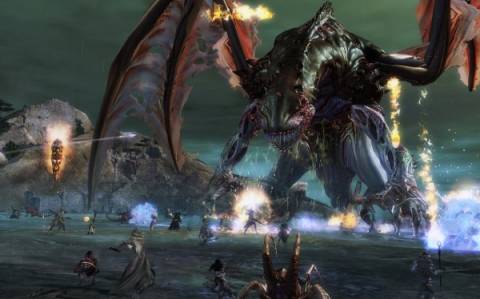
Raiding
Paired with the above, there is no traditional raiding. You’ve got 5-man dungeons that all have “hard modes.” And of course, you have absolutely massive meta-events across the entire world to engage in. Some of the larger world events and bosses require at least 50 players to tackle--so sure, there’s still raiding. It’s just a bit more dynamic, and much larger in scale. I, personally, think this is the right way to approach world bosses. They're complex encounters that you could directly compare to traditional MMO raid encounters... just a bit, well, bigger.
Subscription fees
ArenaNet funds their content through box sales and harmless cash shops. They believe the subscription fee is simply something that stands in the way of new players, and forces players to squeeze every hour out of their monthly fee as possible. More than that, a lack of a subscription fee means they don’t have to artificially drag players along a treadmill (like gear-grinding).
Rotations and Priorities
You only have a set number of abilities on your bar at a time (sort of like a deck of cards), most of those abilities have a cooldown and a variety of tactical uses. What does this translate to? Combat is reactive and dynamic instead of practiced. You could equip yourself with an ability that throws down a massive wall of fire, powering up allies with buffs, and setting enemies ablaze when they walk through. More than that, powers interact. If a ranger shoots an arrow through your wall of fire, it’ll light up and deliver burning on anything he hits.
In essence, ArenaNet condenses down your traditional rotation into a single damage button (which some loadouts don't even have--like the Mesmer's staff set), and a variety of situation-specific abilities that should be used at opportune times, rather than used as frequently as possible. What does this do? Well, it forces your eyes off your action bar, and back up onto the battlefield.
Shards
By shards, I'm talking about the traditional MMORPG server model. You log into a server, create a character, and generally have to pay to switch servers. It's a problem when it comes to playing with friends, but not a problem in Guild Wars 2. Basically, you choose a home server, and this will act as your semi-permanent server for all your characters. This will be the home team that you will represent in World vs. World gameplay. At any point, you can freely 'visit' any of the other servers to play with friends, or do as you like. Quest up, do some organized PVP, whatever you like. At the end of the day, you come back to your home server while retaining any of the progress you had made with your friend. The only limitation with this system is that you can't engage in World vs. World PVP while visiting another server. And they've stated that you'll be able to reallocate home servers with microtransactions if you want to.
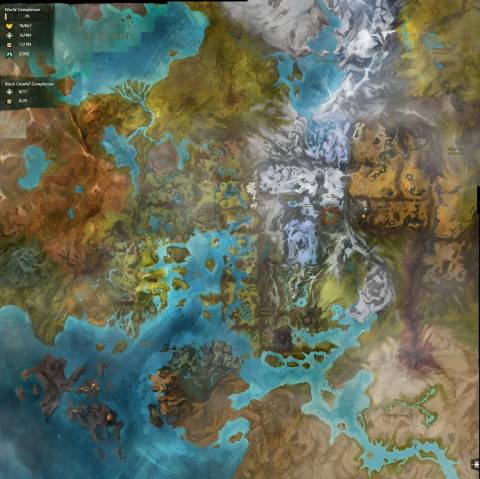
Obsolete Content
The game has one faction, scaled loot, and scaled player level. What does this mean? There is no obsolete content in the game. At any level, you can travel to any zone, play with any player, and still have an experience that is completely relevant to you. Scaling down won't be worth entirely the same experience as non-scaled content, but it'll certainly be rewarding enough to not discourage you from exploring lower leveled areas. If there's a massive world boss in the Sylvari 1-10 area, a level 80 Charr can travel to that region, take on that boss, have a hell of a time killing it, and walk away with some 75-80 gear as a reward. Add to this the fact that ArenaNet doesn't need to split their content available to you in half with a second faction, and you end up with a ton of content available to you at any level.
Quest Rewards
The game has a karma currency system. As you participate in events and do stuff around the world, you accrue karma. By fulfilling hearts around the world, you open up unique vendors that sell you karma goods. They effectively open up a large window of karma goods, and allow you to spend your karma on whatever cool gear you want. You're never forced to choose between two options that you couldn't care less for. You only spend karma when you want to. Personal story tasks still give you traditional quest rewards, but they aren't the primary form of questing... so it doesn't really count, right?
Server Queues
A neat little feature, won't spend too much time on it. But there are no server queues. When you try to log into a full server, you'll be pushed into an overflow server. You can do events, kill stuff, and whatever you like. When it's your time to join into the game, a dialogue box will pop up and ask you as to whether or not you'd like to start playing with the main server population. Simple as that.
PVE / PVP Server Distinctions (+open world griefing)
In traditional MMORPGs, you generally have server rule-sets. Some are PVP, some are PVE. This distinction typically divides communities with debates (an issue our very own Kessler Run and Good Luck Have Bothans had to deal with). In Guild Wars 2, there is one server type. All PVP content is accessed via a queuing system, and PVE is player-grief-free. Without multiple factions, it is rather difficult to have open world PVP after all. Obviously the brilliant inclusion of World vs. World content was created to offset this design challenge. I mean, ArenaNet knows that if players don't get to stab others outside of a controlled environment, people are going to rage.
Fashion Disasters
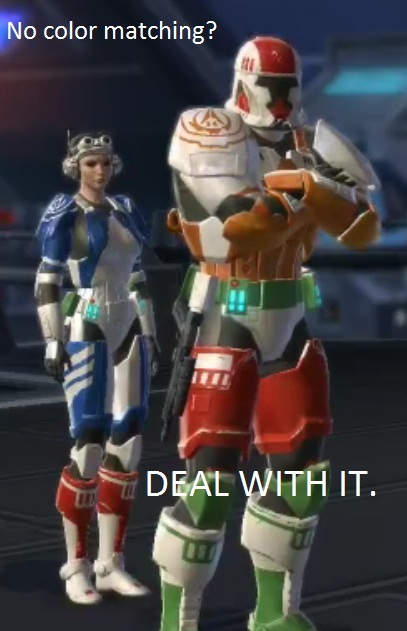
Okay. Well, there are still going to be fashion disasters. But the dye system in Guild Wars 2 allows you to set a colour scheme, change it at any time, and all your armor will match that colour. This isn't really a new thing, DC Universe Online had a similar system. But it's a welcome addition that we often don't see. Beyond the colour schemes, you have the ability to apply any gear's stats to any other gear's cosmetic look. It also gives players another delicious collectible to obsess over: dyes! Basically, dyes are account-bound when acquired. So building up a dye inventory will drive OCD types bananas!
Honourable Mentions
- Homing ranged attacks
- Elevation being combat-irrelevant
- Linear skill acquisition
- Talent trees
- Commitment to particular crafting specializations
- Resource mechanics (save Thief's initiative)
- Single-objective tasks
- Targeting
--
So there you have it. They clearly give no fucks about tradition, and personally, I think they should be applauded for that. Questions, thoughts, corrections? Go for it.
